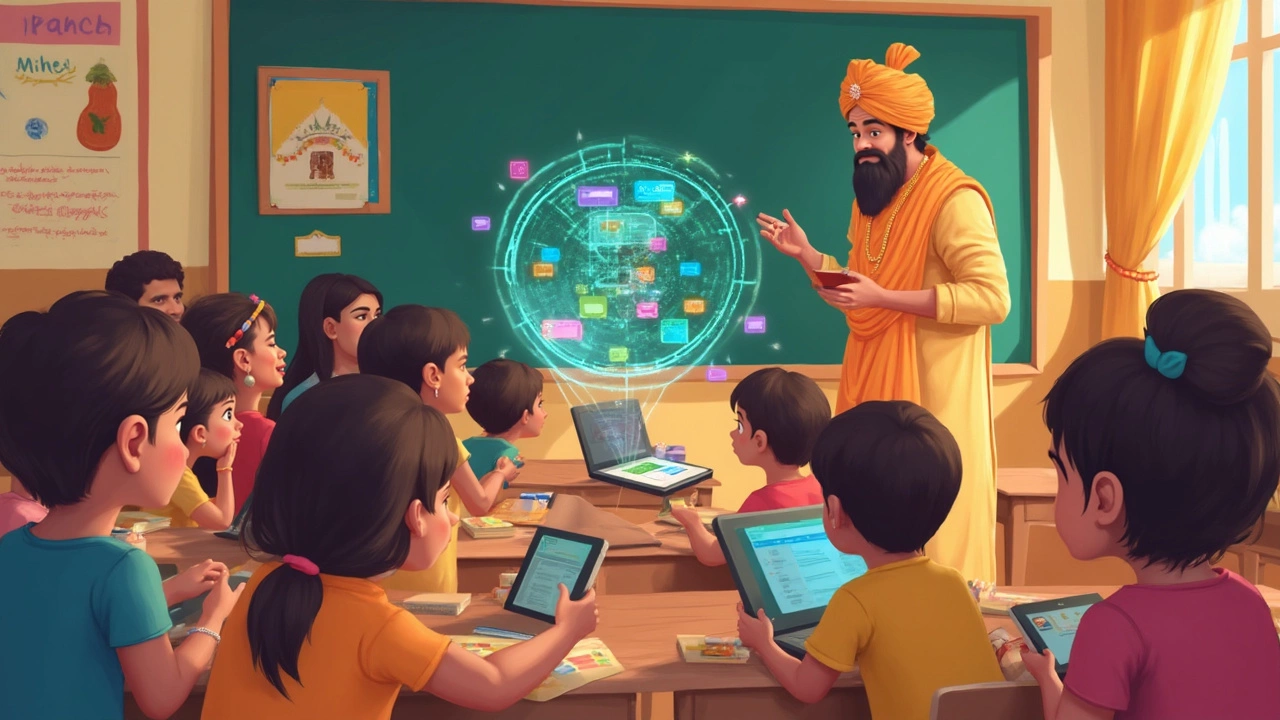The digital era has transformed education, making it more accessible and versatile than ever. With a variety of e-learning platforms available, students and lifelong learners can take virtually any course they desire, from the comfort of their homes. The shift from traditional learning environments to digital ones has been rapid, driven by advancements in technology that bridge gaps between learners and knowledge.
Understanding which platforms stand out in this crowded digital field can help learners make informed decisions. Each platform offers unique features tailored to different audiences, whether you're seeking academic knowledge, skill development, or personal enrichment. Whether you're looking to take a one-time course or embark on a continuous learning journey, there's something for everyone in the expanding world of e-learning.
- The Evolution of Online Learning
- Key Features of Popular Platforms
- Choosing the Right Platform
- Future of Digital Education
The Evolution of Online Learning
Online learning has come a long way since its inception, evolving from basic correspondence courses delivered via mail to a sophisticated digital ecosystem available at our fingertips. In the late 20th century, the internet began to gain traction, laying the groundwork for what would become a digital learning revolution. Early e-learning platforms were simplistic, often limited to text-based content and rudimentary interaction through email and chat. As technology progressed, so did the capabilities of these platforms, integrating multimedia, interactive assignments, and forums for student discussions, which allowed for a richer learning experience.
The turn of the millennium marked a significant shift as broadband became more ubiquitous, and with it, the potential for more dynamic and engaging content. Initiatives like MIT's OpenCourseWare started to democratize access to education, breaking traditional barriers of location and cost. Learners across the globe could now access high-quality courses straight from prestigious institutions. With the rise of massive open online courses (MOOCs) around 2012, led by platforms such as Coursera and edX, the landscape of online learning was set on a global stage. A report by Class Central noted that in 2020, over 180 million learners enrolled in MOOCs, a trend accelerated by the demand for flexible learning during the COVID-19 pandemic.
As these platforms matured, they began offering more personalized learning experiences using AI-driven analytics to tailor course recommendations to individual users, making learning more efficient and targeted. Online education platforms have diversified, now serving a broad spectrum—from K-12 students to professionals seeking continuing education. This evolution not only highlighted the adaptability of e-learning to meet diverse educational needs but also its resilience in the face of challenges. As educational technology continues to evolve, platforms are increasingly integrating immersive technologies like AR and VR, offering even more interactive and experiential learning environments.
A transformative perspective was offered by Salman Khan, founder of Khan Academy, who said, "In the future, education will be beyond classrooms; it will be a personalized network of learning experiences."
Today, users can choose from a wide array of courses, from arts and humanities to coding and data analysis. As we stand on the cusp of a new era of digital learning, the challenges ahead involve ensuring inclusive access and bridging the digital divide so that everyone can benefit equally. The journey so far demonstrates the profound impact that technological advancements have had on education, creating opportunities that were unreachable just a few decades ago. These developments suggest a bright future for e-learning platforms, which continue to innovate and transform traditional education paradigms.

Key Features of Popular Platforms
In the ever-evolving landscape of e-learning, certain platforms have uniquely positioned themselves by offering features that cater to diverse learning needs and preferences. One of the key aspects propelling these platforms into the spotlight is their accessibility. With the advent of smartphones and mobile technology, platforms like Coursera and Udemy have ensured that their content is mobile-friendly, allowing learners to access courses anytime, anywhere. This flexibility is crucial for students and professionals juggling multiple responsibilities. For instance, a mother attending to household duties can simultaneously learn new skills, directly from her kitchen.
Another significant feature is the range of courses offered. From academic subjects such as mathematics and science to professional skills like digital marketing and graphic design, the spectrum is broad and inclusive. This diversity ensures that there's something for everyone, regardless of age, interest, or career stage. Platforms such as Khan Academy, for example, provide free access to a myriad of educational resources, leveling the playing field for learners globally. A study conducted by the Bill & Melinda Gates Foundation revealed that over 1.5 billion learners accessed free educational content online during the pandemic, highlighting the importance of such offerings.
Interactivity and engagement also play a pivotal role. These platforms often feature interactive quizzes, peer reviews, and forums that foster communication between students, enhancing the learning experience. Some courses offer certificates upon completion, which can be a valuable addition to a learner's professional portfolio. As of 2023, Coursera saw a 64% increase in enrollments due to the appeal of industry-recognized certificates.
An education without certificates is like food without salt - indispensable yet incomplete, as noted by Sarah L. Johnson, an education analyst.
Moreover, personalization is emerging as a significant element in digital learning tools. Many platforms use AI-driven algorithms to suggest courses based on a user’s past activities or preferences, ensuring a tailored learning journey. Learning Management Systems (LMS) integrated into platforms augment this experience by tracking progress, setting reminders, and even providing feedback. A 2022 survey by EdTech Magazine indicated that 76% of users preferred platforms that offered personalized content over those that did not.
Lastly, affordability remains a cornerstone feature. Platforms like edX and FutureLearn offer courses at competitive prices and occasionally provide scholarships and financial aid. This affordability, coupled with high-quality content, allows learners from various economic backgrounds to access resources that were once exclusive to offline institutions. A comprehensive pricing strategy helps democratize education, ensuring that financial constraints do not hinder the path to knowledge acquisition. These key features collectively encapsulate the ethos of popular online education platforms, setting them as forerunners in the digital education arena.

Choosing the Right Platform
When diving into the world of e-learning, selecting the right platform is akin to finding the perfect shoe – it needs to fit your specific needs and preferences. With countless options available, the task can seem daunting at first. The key lies in understanding what you're looking for and aligning it with the offerings of various digital platforms. Are you seeking a comprehensive course structure, or are you interested in bite-sized learning tailored to fit into a busy schedule? The good news is there's something for everyone. For instance, platforms like Coursera provide accredited university courses, making them a great choice for those pursuing academic credit. On the other hand, Udemy offers a more informal setting with courses ranging from photography to data science, appealing to hobbyists and professionals alike.
The financial aspect is another critical criterion in choosing your platform. Many online education resources operate on diverse pricing models. Some are free, while others might require a subscription or one-time payment. Platforms like Khan Academy are completely free, making education accessible to all, while Skillshare might offer a subscription model that unlocks a wide array of creative and practical courses. It's crucial to assess how much you are willing to invest in your learning tools and how these costs align with your educational goals. As the saying goes, knowledge that’s freely available might sometimes be worth its weight in gold; however, investing financially could ensure access to up-to-date, high-quality resources.
Another significant element in this decision is course variety and specialization. If your goal is to acquire a certification or diploma, platforms affiliated with traditional educational institutions, such as edX or FutureLearn, might be ideal. For more specialized skills, perhaps in tech or design, platforms like Codecademy or MasterClass offer tailored, industry-specific content. Some platforms also provide interactive elements like quizzes, projects, and forums to enhance learning. Engaging with fellow learners and receiving real-time feedback can greatly enrich the educational experience.
"Education is what remains after one has forgotten what one has learned in school," said Albert Einstein. The emphasis on real-world skills and applicable knowledge sets digital learning apart from traditional methods, catering to ever-evolving market demands.
In addition to these considerations, always take user reviews and community feedback into account. Other learners' experiences can provide invaluable insights into the reliability and efficacy of the platform. Explore forums, review sections, or even ask acquaintances who have ventured into digital platforms for their opinions. These insights can often highlight hidden gems or pitfalls that aren't visible at first glance. Ultimately, the chosen platform should cater to your learning style, be it through videos, interactive modules, or written content, and offer a supportive community to assist throughout your educational journey.

The Future of Digital Education
As we stand on the brink of a new epoch in education, it's clear that e-learning platforms are not just a temporary solution but a permanent fixture in the landscape of education. The rapid digitization brought about by a need for remote learning during global disruptions has created a fertile ground for innovation. In this brave new world, education technology companies are continuously exploring new methods to engage learners and enhance pedagogical practices. We are seeing trends towards more personalized learning experiences, where algorithms track individual progress and adapt content to suit personal learning speeds and styles. This is notably different from the traditional one-size-fits-all educational approach.
The use of artificial intelligence (AI) is becoming increasingly important in today's learning landscape. AI can help create interactive and immersive learning environments. Virtual reality (VR) and augmented reality (AR) technologies are expected to transform the e-learning environment further by providing simulations and virtual field trips that enrich the leaning experience. These immersive technologies are not only engaging but enable learners to apply theoretical knowledge in practical scenarios without the traditional constraints of geography and cost. A report by MarketsandMarkets forecasts the global EdTech and smart classroom market to grow from $85.8 billion in 2022 to $181.3 billion by 2025, demonstrating the burgeoning interest and investment in this sector.
The democratization of education is also a crucial aspect of the future. With platforms like Coursera and Khan Academy, quality education is no longer restricted to the select few but is available to anyone with an internet connection. As broadband accessibility spreads to more remote areas, the digital divide might narrow, emphasizing inclusivity in education across the globe. A noteworthy remark by Salman Khan, founder of Khan Academy, captures this evolution, “Education is a human right. But too often, it is a privilege of those with access and resources to afford quality learning. Technology is instrumental in changing this narrative.”
Social learning, which encourages collaborative engagements online, is also increasing in significance, changing the traditional learner-teacher dynamic. Platforms are incorporating more social features, turning coursework into collaborative projects and discussion-based modules. This approach not only hones critical thinking but also prepares students for the increasingly collaborative nature of the modern workplace. The convergence of learning with social interactions seeks to instill a sense of community in otherwise isolated remote learning experiences, providing some of the social stimuli found in traditional educational settings.
Additionally, lifelong learning is anticipated to become the norm, with online education platforms offering modules that cater not just to accredited academic degrees but also to skill acquisition and professional development. In sectors characterized by rapid change, such as IT and digital marketing, continuous learning has become pivotal. Micro-credentials and digital badges are emerging as standardized recognition forms for skills acquired outside of formal education systems. It’s an exciting time for learners and educators alike as these advancements continue to unfold, promising a horizon full of possibilities in educational attainment.










0 Comments